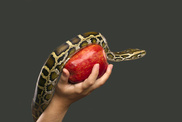|
Linking Moralism and Rigid Thinking
Rigid thinking is particularly dangerous when coupled to moral righteousness and absolutism, as seen through the lens of history. Similar patterns of dogmatic belief are at work in inquisitions, crusades, witch trials, religious and ideological revolutions, and all attempts at coercive conversion. In every instance, one group disenfranchises another for its own security and status by dehumanizing the other group, be they servants, slaves, or lower caste, class, or “order,” or by demonizing an enemy as a monolithic evil. 
Religious uncertainty correlates with greater fear of sin
05 January 2015 by Nicholas C. DiDonato Religious people often struggle with uncertainty. They may attend church on a regular basis, read their sacred texts, and pray daily, yet they may still have nagging doubts about their religion. Such religious uncertainty may have an unexpected side-effect: an increased fear of sin. Thomas Fergus and Wade Rowatt (both of Baylor University) found that greater uncertainty about one’s religion indeed correlates with a greater fear of sin and its consequences. More precisely, uncertainty, or rather the intolerance of uncertainty, from a psychological point of view forms the core of obsessive-compulsive disorder (OCD). Put another way, OCD leads to a need to have control and such a need makes uncertainty intolerable. In terms of religion, “scrupulosity” is a type of religious or moral OCD that occurs when a person fears sin for no reason. With this connection between uncertainty and sin in mind, Fergus and Rowatt wanted to investigate how uncertainly affects fear of sin and fear of God. To do this, they recruited adults from Amazon’s Mechanical Turk. Since atheism may muddle their statistics, they removed all those who did not believe in a higher power, leaving 120 participants. These participants would then go through a four phase survey. First, they would complete the General Religiousness Scale (GRS) which consists of four questions (How religious do you consider yourself to be? How often do you attend religious services? How often do you read the Bible, Koran, Torah or other sacred book? About how often do you pray or meditate outside of religious services?). |
- Home
- Overview
-
Understanding Hate
- Introduction
- What is Hate? >
-
The Roots of Hate
>
- Early Imprints >
- What Are We Doing To Our Children? >
- Effects of Trauma and Abuse >
- Causes and Effects of Bullying
- Trauma, bigotry, violence linked
- Authoritarian Upbringings >
- Absolutism and Insularity >
- Papers: Early Roots of Prejudice
- Impaired Cognition >
- The Violent Brain >
- Roots of Violence and Cruelty >
- Ghosts of the Past >
-
How Hate Manifests
>
- Hate in the News >
-
Group Influence
>
- Social Defenses >
- Fanning the Flames >
-
How We Fool Ourselves
>
-
Brain and Belief
>
- Search for Certainty >
- Index: All Biases, Distortions and Influences
-
Overcoming Hate
- Overview of Topics
- Introduction
-
Prevention
>
- Education >
-
Intervention
>
- Social Support and Inclusion >
- Helping Children in Dire Conditions >
- Preventing Violence and Bullying >
- Standing Up To Prejudice, Racism, and Bigotry >
- Training Our Protectors >
- Healing the Hurt >
- Educating Our Leaders >
- Resolving Conflict >
- Israel-Palestine >
- Promoting Dignity >
- Healing the Ghosts of the Past >
- Restorative Justice >
- Confronting Mass Atrocities >
- Social Advances >
- More Solutions >
-
Resources
- Tools